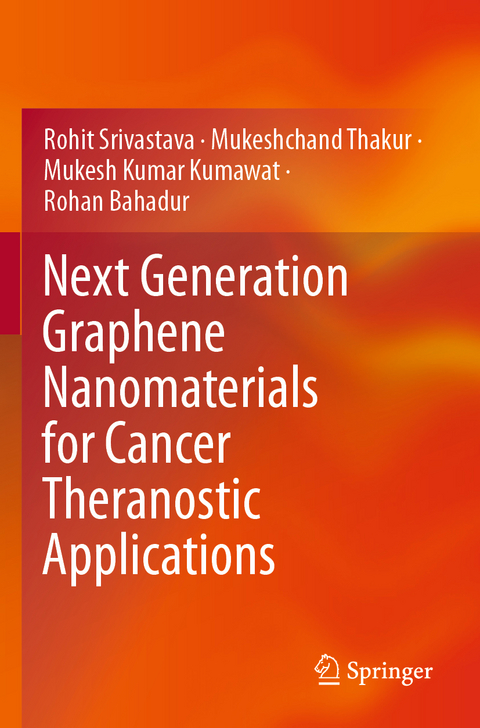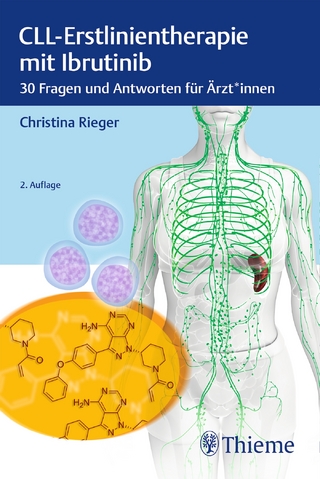
Next Generation Graphene Nanomaterials for Cancer Theranostic Applications
Springer Verlag, Singapore
978-981-336-305-2 (ISBN)
Dr. Rohit Srivastava is currently working as a Professor and Head at the Department of Biosciences and Bioengineering, Indian Institute of Technology (IIT), Bombay. After completing his Bachelor's in Electronics Engineering from VNIT Nagpur in 1999, he joined Tata Consultancy Services, SEEPZ, Mumbai for a year and then went on to do a M.Sc. and Ph.D. in Biomedical Engineering from Louisiana Tech University, Ruston, USA. His specialization lies in PoC diagnostic devices, biomedical microsystems devices (MEMS), nanoengineered biosensors, photothermal therapy in cancers and nanoengineered orthopedic applications. His lab has funded projects across all domains, from point of care diagnostic devices to biosensors to cancer nanotechnology to MEMS drug delivery devices. He has co-authored over 120 research articles in international journals, 100 conference proceedings, and filed more than 100 U.S. and Indian patents, copyrights, and trademarks. Hehas been instrumental in technologies such as SYNC, ToucHB, Ucheck, and CareMother that have been successfully commercialized in the Indian market through his student entrepreneurs. Rohan Bahadur worked at the Department of Biosciences and Bioengineering in IIT Bombay, India on 2D materials such as graphene, MoS2, MXenes and their 0D analogues for biomedical and biosensing applications. As part of his Masters in VIT University, Vellore, India he did a research project at ICMCB, CNRS, University of Bordeaux, France on the production of patchy particles as building blocks of limited valence with Professor Etienne Duguet. He has co-authored 5 research publications and has 3 patents/applications. Dr. Mukesh Kumar Kumawat pursued his Ph.D. at the Department of Biosciences and Bioengineering at Indian Institute of Technology (IIT) Bombay, India, where his research focused on the synthesis, characterization, and applications of graphene nanomaterials in bio-imaging, sensing, drug delivery, and photothermal therapy of tumor cells. He has also worked on the exfoliation of MoS2 nanosheets, MoS2 quantum dots synthesis, and their biomedical applications. He has co-authored research articles on the synthesis of gold nanomaterial, characterization, and their application for sensing applications. He has co-authored 15 research publications and 6 patents/applications. Mukeshchand Thakur has worked at the Department of Biosciences and Bioengineering at Nanobios lab, Indian Institute of Technology (IIT) Bombay, India. While working at IIT Bombay, his research interests focused on the synthesis of multi-fluorescent quantum dots for biomedical applications. He has also participated in the Taiwan International Internship Program and is a recipient of the Royal Society of Chemistry Award (2014) at International Conference on Nano Science and Technology, India. He has authored multiple research publications in the field of biosensing and serves as a reviewer for over 10 international journals.
Chapter 1: Introduction and Brief History.- Chapter 2: Types of Carbon-based Nanomaterials and Advent of Graphene.- Chapter 3: Physicochemical Interactions and Toxicity Analysis of Graphene Nanomaterials.- Chapter 4: Graphene Nanomaterials for Multi-Modal Bioimaging and Diagnosis of Cancer.- Chapter 5: Graphene Nanomaterials for Therapy of Cancer.- Chapter 6: Outlook and Future Perspectives for Graphene-Nanomaterials.
| Erscheinungsdatum | 28.01.2022 |
|---|---|
| Zusatzinfo | 82 Illustrations, color; 11 Illustrations, black and white; X, 132 p. 93 illus., 82 illus. in color. |
| Verlagsort | Singapore |
| Sprache | englisch |
| Maße | 155 x 235 mm |
| Themenwelt | Medizin / Pharmazie ► Medizinische Fachgebiete ► Onkologie |
| Medizin / Pharmazie ► Physiotherapie / Ergotherapie ► Orthopädie | |
| Technik ► Maschinenbau | |
| Technik ► Medizintechnik | |
| Schlagworte | biomedical applications of graphene • cancer diagnosis • Cancer Therapy • Carbon Nanomaterials • graphene as cancer theranostic tool • Graphene in cancer research • Nanomaterials for tumor targeting • Nanomaterials in cancer theranostics • nanotheranostics for cancer • Synthesis of graphene nanomaterials |
| ISBN-10 | 981-336-305-3 / 9813363053 |
| ISBN-13 | 978-981-336-305-2 / 9789813363052 |
| Zustand | Neuware |
| Informationen gemäß Produktsicherheitsverordnung (GPSR) | |
| Haben Sie eine Frage zum Produkt? |
aus dem Bereich


